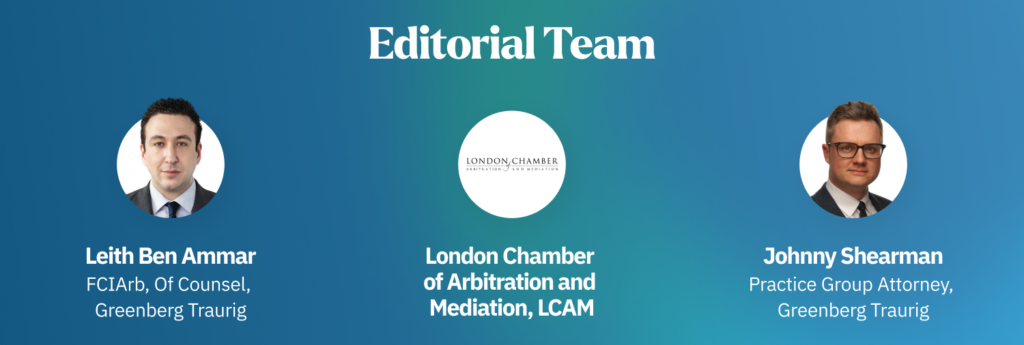THE AUTHORS:
Leith Ben Ammar, Of Counsel at Greenberg Traurig
Johnny Shearman, Group Practice Lawyer at Greenberg Traurig
Harvey Rees, Associate at Greenberg Traurig
Struan F. Clark, Associate at Greenberg Traurig
London Chamber of Arbitration and Mediation, LCAM
The London Chamber of Arbitration and Mediation (LCAM) and Greenberg Traurig London have partnered on a series of articles looking at arbitration and emerging technologies. This easy to digest series provides an introduction to technologies such as smart legal contracts, generative AI, virtual and augmented reality and big data and considers their interplay with international arbitration. In collaboration with LCAM the series is edited by Leith Ben Ammar FCIArb and Johnny Shearman of Greenberg Traurig.
In recent years we have seen many courts and tribunals shift from in-person hearings to virtual hearings, especially when dealing with case management and procedural issues. The Covid-19 pandemic accelerated this change but with advancements in virtual reality (“VR”) and augmented reality (“AR”), virtual hearings are perhaps a more appealing prospect now more than ever before.
AR is generally accessed via a screen displaying digital 3D objects within our existing surroundings. VR enables users to jump into the virtual world; it requires the use of a headset device that facilitates the formation of a virtual environment that users can interact with.
In 2022, it was estimated that the combined global AR and VR market size was at USD 41.56 billion and is projected to reach around USD 859.35 billion by 2030. This can largely be apportioned to the continued adoption of the technology in the gaming industry.
Whilst neither VR nor AR appear to be utilised frequently in arbitrations at present, the broader use of this technology and the popularity of virtual hearings in the post-pandemic environment present an opportunity for expanded exploitation in the future. Notably, the 2021 International Arbitration Survey – Adapting Arbitration to a Changing World revealed that “If a hearing could no longer be held in person, 79% of respondents would choose to ‘proceed at the scheduled time as a virtual hearing’” and “72% of respondents sometimes, frequently, or always use virtual hearing rooms”.
In the courtroom environment, VR has been used to show jurors around the scene of a crime prior to deliberation. For example, as early as 2016, the Bavarian State criminal office created an interactive scene of the Auschwitz concentration camp to aid the prosecution’s case in a war crimes trial. Studies have found that jurors using VR headsets had better recall, spatial accuracy and more consistent verdicts. Similarly, VR is being used to prepare victims of crime to provide evidence in court, as it has been shown to relieve anxiety by introducing the victim to a court setting.
Outside of the courtroom, AR is increasingly used to overcome the language barriers that can arise in any dispute, especially multi-jurisdictional cases – with tools ranging from smartphone translation applications to more sophisticated AR devices that translate conversations in real time.
However, although VR and AR have been widely available in recent years, technological strides made in relation to arbitration proceedings appear to be limited to the use of teleconferencing apps. While perhaps surprising given the benefits outlined above, there are several barriers that need to be overcome before the use of VR/AR in arbitration proceedings is broadly adopted.
First, the technology is not inexpensive. Questions will inevitably arise as to which side of the dispute is responsible for the additional cost. Will the costs be split between the parties, or will arbitral institutions incur at least the purchase price of the equipment as a way of making themselves more attractive to the market?
Article 18 of the UNCITRAL Model Law on International Commercial Arbitration requires equality of parties – and this is reflected in most national arbitration laws. Aesthetics may well affect how the tribunal perceives evidence. If one party has the means to use VR/AR to present its evidence, there is the potential to argue an unfair advantage exists over its counterparty (for example by being more compelling or by leaving more of a lasting memory in the tribunal’s mind).
In addition, although many hearings are done virtually (such as case management conferences, hearings for interim applications and pre-hearing conferences), the tendency in arbitration is still for substantive hearings on merits to be in-person. This is because, for now at least, there is no way to completely emulate the physical experience of attending a hearing in-person, particularly when dealing with the cross examination of witnesses.
As confidence in the technology grows and the benefits (including the impact on the carbon footprint) become more accepted, arbitral tribunals may adopt conducting site visits virtually, without the time and cost implications of travelling to various destinations.
ABOUT THE AUTHORS:
Leith Ben Ammar FCIArb is Of Counsel and Co-Chair of Greenberg Traurig’s London office Ability Network. His practice focuses on complex, high value and sensitive international dispute resolution. Leith is a qualified arbitrator and Fellow of the Chartered Institute of Arbitrators. As counsel, he represents clients from Europe, Africa, Asia, America and the Middle East across multiple sectors. He has particular experience in disputes involving very large and technologically complex infrastructure, energy and real estate projects in emerging markets. Leith also has in-depth knowledge of legal issues involving international arbitration and emerging technology. He is the Co-Chair of ENERAP’s UK Chapter, a former supporting expert at the University of Oxford’s Entrepreneurship Centre and an alumnus of its Blockchain Strategy Programme.
Johnny Shearman is a Group Practice Lawyer at Greenberg Traurig LLP. Johnny is dispute resolution lawyer and has gained significant experience in handling a broad spectrum of domestic and international disputes. His legal knowledge encompasses complex contractual and tortious disputes, civil fraud and asset recovery, banking and professional negligence litigation and contentious insolvency matters. His experience includes disputes at all levels from County Court to Supreme Court proceedings, as well as international arbitration.
Harvey Rees is a member of the Litigation and Arbitration Practice in Greenberg Traurig‘s London office. Harvey focuses his practice on international commercial litigation and arbitration, concentrating on complex multi-jurisdictional cases which often involve fraud, particularly within the banking and financial services sectors.
Struan Clark is a member of the Litigation and Arbitration Practice in Greenberg Traurig’s London office. His practice focuses on complex, high value international litigation, arbitration and fraud investigation. Struan represents clients from Europe, the United States, Africa, Asia and the Middle East across the construction, infrastructure, real estate, technology, manufacturing and financial services sectors.
London Chamber of Arbitration and Mediation, LCAM is part of the London Chamber of Commerce and Industry (“LCCI”) but independent in its administration of disputes. LCAM was launched to provide innovative, speedy, and cost effective services to help resolve commercial disputes. LCAM offers arbitration, expedited arbitration, and mediation services delivered by a diverse panel with many years’ experience in alternative dispute resolution. LCAM’s Model Mediation Procedure provides a framework for an effective and confidential mediation process. Oversight is provided by the LCAM Advisory Board. Fees are fixed, providing cost-certainty and good value without compromising quality.

The views and opinions expressed in articles posted on Daily Jus are those of the authors and do not reflect the official policy or position of Daily Jus.





